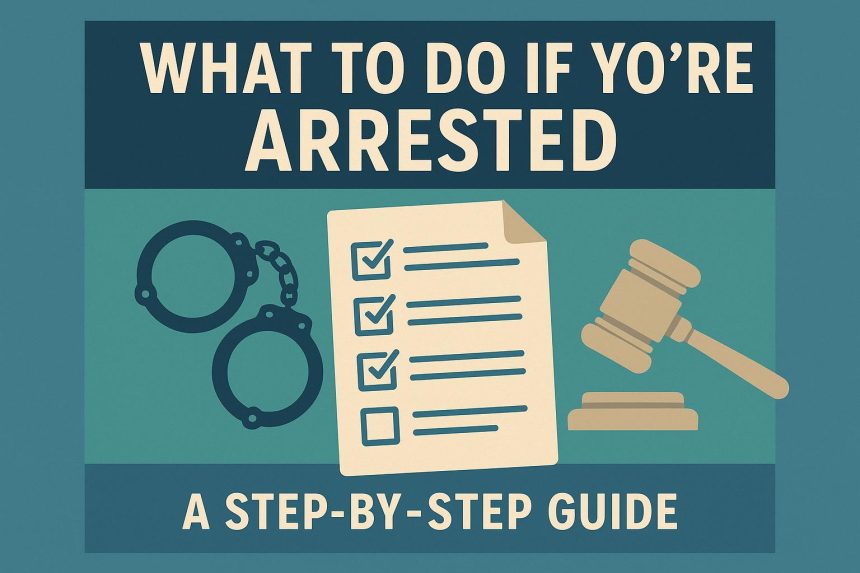Getting arrested can be one of the most stressful and frightening experiences of your life. Even if you haven’t done anything wrong, the moment those handcuffs go on, panic and confusion can set in. The decisions you make in the first few hours after an arrest can have a major impact on the outcome of your case. That’s why it’s important to understand your rights and know exactly what to do if you ever find yourself in this situation.
This step-by-step guide walks you through what to expect and how to protect yourself legally.
Stay Calm and Don’t Resist
The first and most important step is to remain calm. Arguing, pulling away, or physically resisting arrest will only make things worse and can lead to additional charges such as resisting arrest or assaulting an officer. Justie Nicol, Greenwood Village DUI Defense Lawyer of Colorado Lawyer Team, guides, “Even if you believe the arrest is unfair or unlawful, this is not the time to argue your case. Keep your hands visible, follow instructions, and stay as composed as possible.”
Remaining calm not only protects you physically but also helps you think more clearly and avoid saying or doing something that could be used against you later.
Exercise Your Right to Remain Silent
One of the most powerful rights you have is the right to remain silent. As Anthony DeLuca, Pittsburgh DUI Defense Attorneys at DeLuca, Ricciuti & Konieczka, says, “Anything you say to law enforcement can and will be used against you in court. Many people make the mistake of trying to explain themselves, thinking they can talk their way out of an arrest. In reality, this often backfires because police officers are trained to use your words to build a case against you.”
After providing your name and basic identifying information, you do not have to answer questions without a lawyer present. A simple statement like, “I am exercising my right to remain silent and want to speak with an attorney,” is enough to assert this right.
Ask for an Attorney Immediately
As soon as you are taken into custody, clearly state that you want to speak with a lawyer. This triggers your Sixth Amendment right to legal counsel. Once you request an attorney, questioning should stop until your lawyer is present.
As Thomas Lane, San Antonio Criminal Defense Lawyers at Hunter, Lane & Jampala puts it, “Do not assume that staying quiet is enough—law enforcement may continue to ask questions unless you explicitly invoke your right to an attorney. Whether you can afford one or not, you have the right to representation. If you cannot pay for an attorney, a public defender will be appointed to represent you.”
Do Not Consent to Searches Without a Warrant
Police officers may ask for your consent to search your car, home, or personal belongings. As Amanda Skillern, Houston Aggravated Assault Lawyer at Law Office of Amanda Skillern, PLLC, says, “Unless they have a valid search warrant, you are not required to consent. Politely but firmly say, ‘I do not consent to any searches.’”
Consenting to a search waives your Fourth Amendment protections and may give officers evidence they wouldn’t have had otherwise. By refusing, you preserve your rights and give your attorney more options to challenge evidence later.
Understand the Booking Process
After an arrest, you’ll go through the booking process. This usually includes:
- Recording your personal information
- Fingerprinting
- Taking your photograph (mugshot)
- Confiscation of personal belongings for safekeeping
- Being placed in a holding cell
This process can take hours, depending on how busy the facility is. While uncomfortable, it’s important to remain patient and avoid causing problems, as your behavior will be documented.
Bail and Release Options
In many cases, after booking, you may be eligible for bail. Bail is a financial guarantee that you’ll return to court for your hearings. If you can’t afford bail, a bail bondsman may be able to help by posting a bond on your behalf for a fee.
In less serious cases, you may be released on your own recognizance (OR), which means you’re trusted to return without paying bail. Whether you’re eligible depends on the severity of the charges, your criminal history, and your ties to the community.
Contacting Family or Friends
You have the right to make at least one phone call after being booked. Use this wisely—call a trusted family member, friend, or your attorney directly. If you call someone else, keep in mind that phone calls from jail are often recorded, so avoid discussing the details of your case over the phone. Simply let them know where you are and ask them to contact your lawyer if you don’t already have one.
Appear at the Arraignment
Your first court appearance after an arrest is called an arraignment. At this hearing, you’ll be formally told the charges against you and asked to enter a plea—guilty, not guilty, or no contest. This is also where bail may be reviewed if it wasn’t set earlier.
It’s important to have your attorney with you during this hearing. They can advise you on what plea to enter and may argue for lower bail or release without bail.
Follow Your Lawyer’s Advice
From this point forward, your attorney will guide you through the legal process. They may negotiate with prosecutors, file motions to suppress evidence, or prepare your defense for trial. Be honest with your lawyer about everything, even if it’s embarrassing or incriminating. Attorney-client privilege protects your conversations, and your lawyer can only defend you effectively if they know the full story.
Avoid posting about your case on social media, discussing it with friends, or trying to manage it on your own. Trust your attorney to handle communications and strategy.
Protecting Your Future
An arrest doesn’t always mean a conviction. Many cases are dismissed, charges are reduced, or defendants are found not guilty at trial. However, how you handle the early stages of an arrest can dramatically influence these outcomes. Staying calm, exercising your rights, and securing legal representation quickly are the best ways to protect your future.
Even if you are convicted, an attorney may help you negotiate alternatives to jail time, such as probation, community service, or rehabilitation programs. They may also help you pursue expungement later, so the arrest doesn’t haunt your record forever.
Common Mistakes to Avoid After an Arrest
Just as important as knowing what to do, is knowing what not to do after being arrested. Many people make errors in judgment that end up hurting their case. Some of the biggest mistakes include:
- Talking Too Much: Explaining, apologizing, or trying to “clear things up” almost always works against you. Officers are trained to gather evidence from your words.
- Resisting Physically or Verbally: Even mild resistance can add extra charges and make you look uncooperative in court.
- Signing Documents Without Reading: Never sign anything until your lawyer reviews it. Waiving rights or making written statements can weaken your defense.
- Discussing Your Case on the Phone or Social Media: Calls from jail are often recorded, and social media posts can be used as evidence. Keep all details between you and your lawyer.
- Trusting Verbal Promises from Police: Officers may imply that cooperating fully or answering questions will “make things easier.” In reality, their job is to build a case, not to protect you.
Avoiding these mistakes helps preserve your rights and gives your lawyer the strongest possible foundation to defend you.
Key Takeaway
If you’re arrested, don’t panic. Remember the basics: stay calm, don’t resist, remain silent, ask for an attorney, and avoid consenting to searches. From there, cooperate with the booking process, attend your arraignment, and follow your lawyer’s advice.
Knowing your rights and taking the right steps can make the difference between a devastating outcome and a second chance.
Lynn Martelli is an editor at Readability. She received her MFA in Creative Writing from Antioch University and has worked as an editor for over 10 years. Lynn has edited a wide variety of books, including fiction, non-fiction, memoirs, and more. In her free time, Lynn enjoys reading, writing, and spending time with her family and friends.















